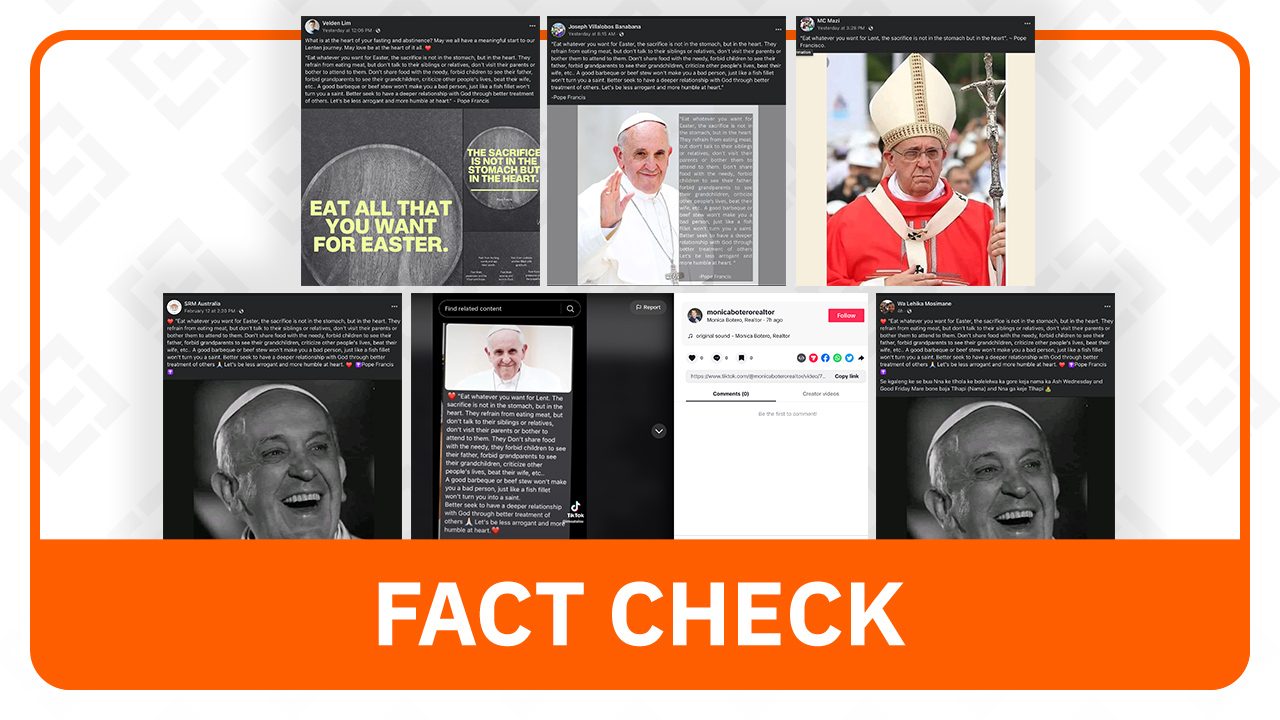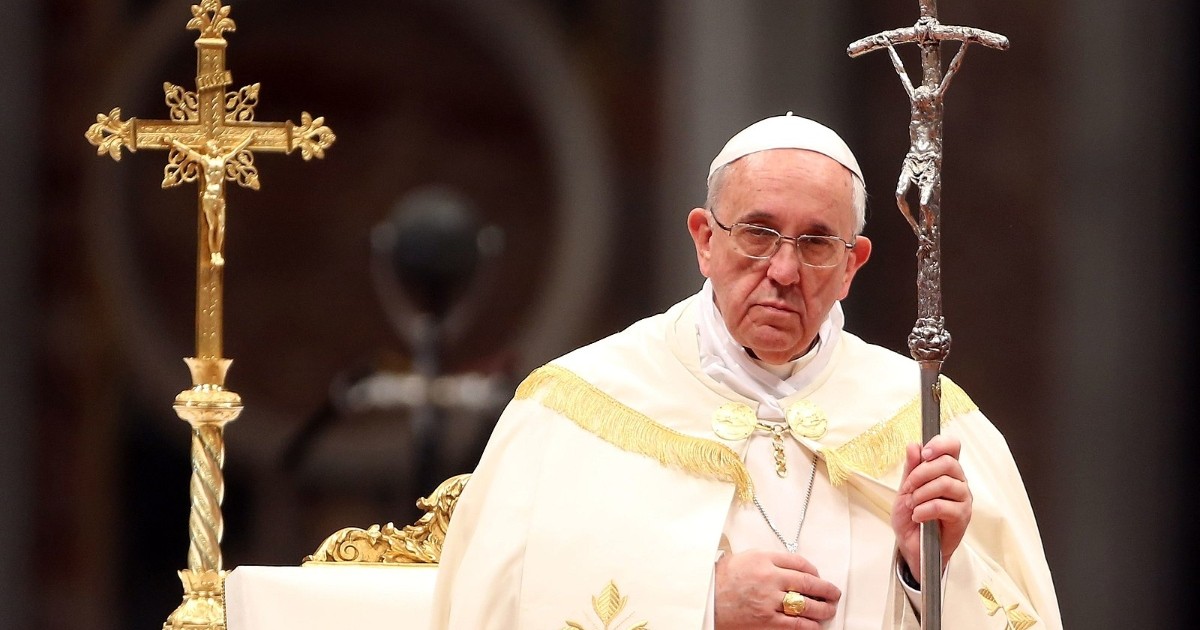Fake Pope Francis Quote: Did He Really Say "Eat Whatever You Want" For Lent?
Is it true that Pope Francis advocated for unrestricted eating during Lent? The answer, emphatically, is no. A fabricated quote, widely disseminated on social media platforms, falsely attributes these words to the pontiff. This misrepresentation has prompted a wave of confusion and necessitates a thorough examination of the facts.
The genesis of this misinformation can be traced to social media posts that began circulating, particularly on Facebook, as the Lenten season commenced. These posts presented a purported message from Pope Francis, claiming he instructed Catholics to "eat whatever you want during Holy Week" because "the sacrifice is not in the stomach, but in the heart." This fabricated message then proceeded to criticize individuals who, while abstaining from certain foods, neglected their familial relationships, suggesting that true piety resides solely in internal reflection rather than outward actions.
The spread of this false statement gained traction, fueled by the ease with which information travels on social media. The purported quote, appearing in various forms, was shared and reshared, often without scrutiny. This led to a misrepresentation of the Pope's actual teachings and a misunderstanding of the significance of Lent for Catholics worldwide.
To further illustrate the extent of the fabrication, consider some of the variants of the statement that have surfaced: Eat whatever you want for Easter, the sacrifice is not in the stomach, but in the heart, read one iteration, further stating, A good roast or meat stew won't make you a bad person. Another variant included the line, Eat whatever you want for lent, with the same concluding sentiment about sacrifice. These statements were often presented alongside images of Pope Francis to enhance their perceived authenticity, thereby furthering the spread of the false narrative.
The deceptive nature of these posts becomes immediately apparent when one considers that the true teachings of Pope Francis, and of the Catholic Church, emphasize a holistic approach to faith. This approach encompasses not only internal reflection and spiritual growth but also external expressions of faith, including acts of charity, prayer, and, yes, the practice of fasting and abstinence during Lent. The purpose of these Lenten practices is not simply to deny oneself food but to create space for spiritual development and to demonstrate solidarity with those in need.
It is important to distinguish between what is real and what is fabricated. In this case, the quote is entirely made up and has no basis in reality. Pope Francis has not issued such a statement in any official capacity. There are no official transcripts or reports available that confirm this. Those who are familiar with the teachings of Pope Francis are able to discern the misleading nature of this fabricated quote.
The earliest instance of the false quote can be traced back to social media user Maria Borg on February 12, 2024. This initial post and subsequent iterations quickly gained traction and became viral, amplified by others. The widespread dissemination of the fabrication necessitated an official response and clarification.
The spread of this false claim highlights the dangers of unverified information on social media. Many users, without proper verification, accepted the statement as fact and shared it among their networks. This underscores the importance of critical thinking, source verification, and the need to consult trusted sources of information, especially when dealing with religious or political topics.
In fact, Pope Francis actual teachings on Lent are quite different. His focus during this period consistently centered on the importance of personal reflection, spiritual renewal, acts of charity, and prayer. He consistently emphasized the need to approach Lent as an opportunity to deepen ones relationship with God and to serve others with humility and compassion. This is in stark contrast to the fabricated quote, which seeks to diminish the significance of Lenten practices.
The misattribution of the quote to Pope Francis is not just a matter of factual inaccuracy. It is a form of disinformation that undermines the credibility of religious figures and institutions and can potentially mislead believers. It also reflects a larger trend of social media users spreading information without verification, causing confusion and division.
In order to effectively counter the spread of such misinformation, individuals must become more discerning consumers of online content. This means questioning the source of information, verifying claims with reliable sources, and being wary of emotional appeals or sensational statements. It is also important to report false information when it is encountered and to participate in the ongoing effort to promote media literacy.
The spread of the fabricated quote also reveals a deep-seated interest in the activities of the Pope and the Catholic Church. The fact that so many people shared the quote suggests that the words of Pope Francis are valued and that the public has a strong interest in what the Church leaders say.
The Pontiff's words of warning against what he called fake fasting came during the homily on Friday at morning mass in the Casa Santa Marta, further suggesting the falsity of the fabricated quote. He emphasized the importance of consistency and genuine spiritual expression as hallmarks of true Christian behavior.
In a season of prayer, fasting, and almsgiving, Pope Francis' message is clear: genuine transformation comes from an authentic embrace of faith. The fabricated quote, however, promotes a distorted view of faith and suggests that external actions like fasting are unimportant.
It is clear that the Pope's statements about Lent and the significance of the period contradict the fabricated claim. His teachings emphasize the importance of spiritual renewal and acting in accordance with Christian values. The Lenten period is a time for Christians to reflect on their relationship with God and make concrete efforts to improve their lives.
Here's a table with biographical information about Pope Francis:
| Attribute | Details |
|---|---|
| Full Name | Jorge Mario Bergoglio |
| Born | December 17, 1936, in Buenos Aires, Argentina |
| Nationality | Argentine |
| Religious Order | Society of Jesus (Jesuits) |
| Ordained as Priest | December 13, 1969 |
| Consecrated as Bishop | June 27, 1992 |
| Archbishop of Buenos Aires | 1998 2013 |
| Created Cardinal | February 21, 2001, by Pope John Paul II |
| Elected Pope | March 13, 2013 |
| Coat of Arms | Features the symbol of the Society of Jesus (Jesuits), along with the symbols of Christ (IHS) and the Virgin Mary. |
| Papal Motto | Miserando atque eligendo (Having mercy and choosing him) |
| Known For | His focus on mercy, social justice, and interfaith dialogue. |
| Key Initiatives | Embracing people on the margins, environmental protection, and addressing climate change. |
| Notable Encyclicals | Laudato si' (On Care for Our Common Home) and Fratelli Tutti (On Fraternity and Social Friendship) |
| Website | Official Vatican Website |
The case of the fabricated Pope Francis quote serves as a cautionary tale about the need to remain vigilant against the spread of misinformation. Critical evaluation, the use of reliable sources, and an understanding of the context are essential tools in combating the proliferation of fake news and safeguarding the accuracy of information online.
Lent is intended to be a period of spiritual growth and solidarity. It is not about external performance but about internal transformation. It is through reflecting on the importance of faith and following religious practices that one can grow closer to God. The falsehood of this fabricated quote cannot undermine these values or the authentic teachings of the Pope.
The impact of this fabricated quote is a reminder of the challenges that the church and the media face in the current age. The ease with which misinformation can be created and disseminated raises questions about the reliability of all sources of information. Understanding these challenges is the first step in creating a culture of informed awareness.
Ultimately, the matter of the fabricated quote highlights the importance of responsible information sharing and the need for critical thinking. It is essential to verify information before sharing it, and to rely on credible sources for factual accuracy. This is especially important when the content concerns sensitive subjects such as faith.

FACT CHECK Pope Francis quote on eating 'whatever you want' during

No evidence Pope Francis told people to ‘eat whatever you want’ during

Did Pope Francis tell Catholics to ‘eat whatever you want for Easter